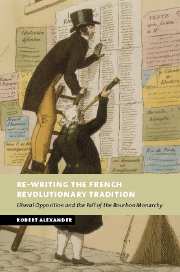 Re-Writing the French Revolutionary Tradition
Re-Writing the French Revolutionary Tradition Book contents
- Frontmatter
- Contents
- List of maps
- List of tables
- Acknowledgements
- List of abbreviations used in notes
- Map 1 The departments of France and their capitals in 1814
- Map 2 The Haute-Garonne
- Map 3 The Isère
- Map 4 The Bas-Rhin
- Map 5 The Seine-Inférieure
- Introduction: Open questions
- 1 False starts and uncertain beginnings: from the First Restoration (May 1814) to the elections of September 1816
- 2 Battle commences: from September 1816 to July 1820
- 3 Self-defeating opposition: from July 1820 to February 1824
- 4 Back on track: from March 1824 to January 1828
- 5 Towards victory?: from January 1828 to July 1830
- 6 Aftermath: Liberal Opposition and the July Revolution
- Conclusion: Revolutionary tradition
- Bibliography
- Index
- NEW STUDIES IN EUROPEAN HISTORY
4 - Back on track: from March 1824 to January 1828
Published online by Cambridge University Press: 04 December 2009
- Frontmatter
- Contents
- List of maps
- List of tables
- Acknowledgements
- List of abbreviations used in notes
- Map 1 The departments of France and their capitals in 1814
- Map 2 The Haute-Garonne
- Map 3 The Isère
- Map 4 The Bas-Rhin
- Map 5 The Seine-Inférieure
- Introduction: Open questions
- 1 False starts and uncertain beginnings: from the First Restoration (May 1814) to the elections of September 1816
- 2 Battle commences: from September 1816 to July 1820
- 3 Self-defeating opposition: from July 1820 to February 1824
- 4 Back on track: from March 1824 to January 1828
- 5 Towards victory?: from January 1828 to July 1830
- 6 Aftermath: Liberal Opposition and the July Revolution
- Conclusion: Revolutionary tradition
- Bibliography
- Index
- NEW STUDIES IN EUROPEAN HISTORY
Summary
PARADISE LOST
Most historians have interpreted the election of the Chambre retrouvée in February–March 1824 as a watershed, but the exact nature of this turning point in Restoration politics needs further clarification. Ultraroyalist triumph was due partly to the opportunities presented by Liberal rebellion, and due partly to the deployment of executive despotism. Under Villèle, there was no longer any place for ultraroyalist attack on the centralization of power, because the latter had become crucial to ultraroyalist ascendancy. This fusion of state despotism and ultraroyalism, however, meant that the latter became increasingly dependent upon the control of government. Independent organization at the grassroots level did not entirely disappear, but it was significantly weakened.
Conversely, Liberal Opposition steadily recovered. In part, recovery could be attributed to ultraroyalist overconfidence. Moderate by the standards of the extreme Right, Villèle was nonetheless an ultraroyalist and he put forward a steady stream of legislation that consistently favoured the interests of the former privileged orders. Meanwhile Liberals maintained their posture as representatives of the nation, and they profited as association with patriotism returned to them, while alarm over counter-revolution rose.
In the first session of the new parliament, Villèle tabled two closely related bills. The first proposed indemnification of émigrés whose lands had been confiscated during the Revolution. Indemnification would be funded by a second proposal: conversion on the rates of government bonds from 5 to 3 per cent.
- Type
- Chapter
- Information
- Re-Writing the French Revolutionary TraditionLiberal Opposition and the Fall of the Bourbon Monarchy, pp. 187 - 237Publisher: Cambridge University PressPrint publication year: 2003


